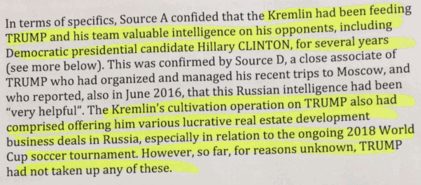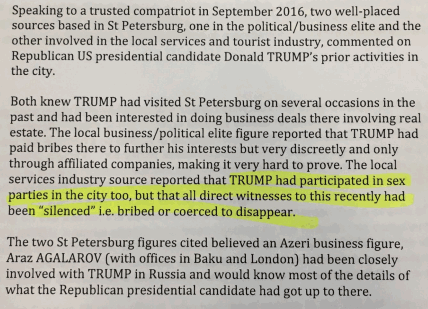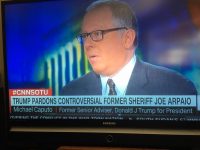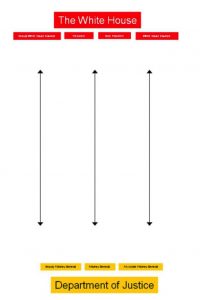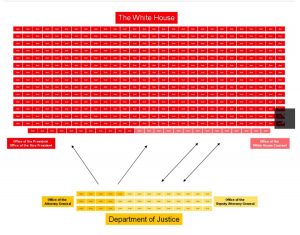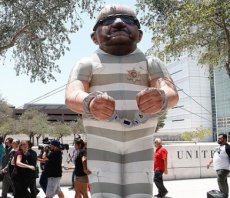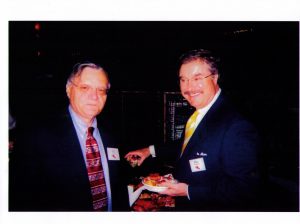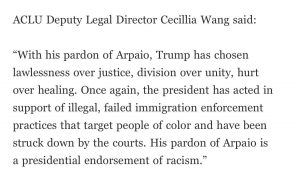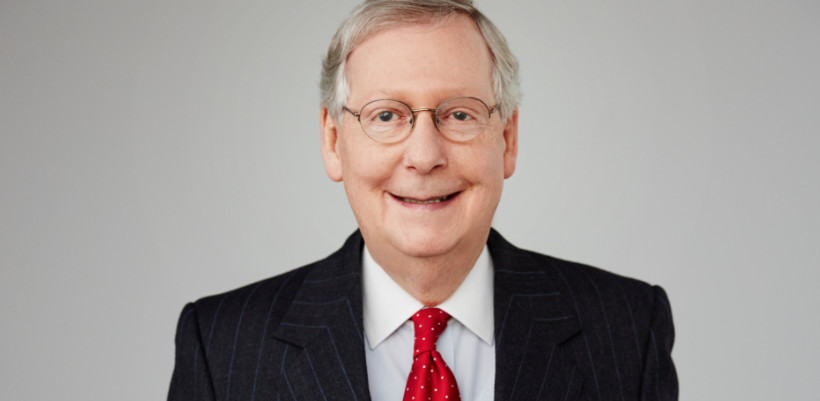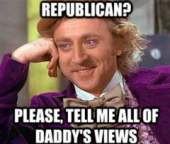How Does Inking a Luxury Residential Real Estate Deal in Moscow Get You Elected President? In the US, I Mean?
There’s an implicit premise of my posts covering yesterday’s big scoops on the emails between Felix Sater and Michael Cohen turned over to the House Intelligence Committee yesterday:
- The Steele Dossier and WaPo’s Trump Tower Scoop
- Michael Cohen Starts Not Recalling His Negotiations with Dmitry Peskov, “Main Protagonist” of Campaign Versus Hillary
The NYT republished fragments of two of the emails. Here’s the key one:
Michael I arranged for Ivanka to sit in Putins [sic] private chair at his desk and office in the Kremlin. I will get Putin on this program and we will get Donald elected. We both know no one else knows how to pull this off without stupidity or greed getting in the way. I know how to play it and we will get this done. Buddy our boy can become President of the USA and we can engineer it. I will get Putins [sic] team to buy in on this, I will manage this process.
On November 3, 2015, two months before the GOP primary started in earnest and barely over a year before the presidential election, mobbed up real estate broker and sometime FBI informant Felix Sater emailed Trump Organization Executive Vice President and Special Counsel to Trump, Michael Cohen. According to the fragment we read, Sater boasts of his access to Putin going back to 2006 (when the Ivanka incident reportedly happened), and said “we can engineer” “our boy” becoming “President of the USA.”
Before HPSCI got the emails, the Trump Organization did a preemptive leak to the WaPo, which successfully cemented the interpretation of the “news” associated with these emails as proof of another contact between Trump associates and Russians. Cohen’s statement to HPSCI, which WaPo’s later reporting quoted, reaffirmed that view, even though key details about it — why, of all the things he couldn’t recall, was whether Putin associate Dmitry Peskov responded to an email in which Cohen asked for his personal response, or why Cohen would email a press contact like Peskov, who readily gives out his personal email, to a general email line that is less likely to be bugged by western intelligence — remain unexplained.
The NYT only released one paragraph of the emails it published; it’s unclear whether that’s all they got, or whether they’ve just chosen to redact all the context.
Nevertheless, this paragraph, presented as it is, ought to have elicited very different “news” reporting: a year before the election, Sater was boasting he could get Trump elected because of his ties to Putin. In an update (the NewsDiffs on NYT’s version of this story are worth reviewing in detail, particularly for the way they shift emphasis away from Sater’s claims in the email), the NYT reprinted Sater’s lawyer’s explanation, which doesn’t address the underlying question at all, even while it replicates the spin that this would be nothing more than a “political win.”
Through his lawyer, Mr. Sater declined on Monday to address why he thought the deal would be a political win for Mr. Trump. He said he brought the project to Mr. Cohen in late 2015, but that he was not working for the Trump Organization and “would not have been compensated” by them.
“During the course of our communications over several months, I routinely expressed my enthusiasm regarding what a tremendous opportunity this was for the Trump Organization,” Mr. Sater said.
Again, perhaps the full emails justify this approach. But absent a better explanation, the question that should be answered by this scoop — well before the excitement of proof of yet one more tie between a Trump associate and increasingly senior Russians — is why Sater believed whatever he was emailing Cohen about would lead to Trump’s election?
Even assuming Cohen’s personal intervention via Peskov got Putin to rubber stamp the missing permits in early January 2016, which was the most optimistic scenario short of the personal trip to Moscow Sater was pushing Cohen to take, how would that have had any influence on the Presidential election at that point 11 months away? Obviously, the actual building, its clients, the possibility it might be used to launder money, perhaps even back into Putin’s pockets — none of that would be in place in time for the election. Yet another luxury residence in a city most American voters will never visit isn’t going to flip many votes, if any. More realistically, the deal would be regarded just as reporters are now spinning it, as an inappropriate potential conflict of interest, even ignoring the Russophobia that would ratchet up later in the year.
The second email NYT published in part might be a quasi explanation.
Michael we can own this story. Donald doesn’t stare down, he negotiates and understand the economic issues and Putin only want to deal with a pragmatic leader, and a successful business man is a good candidate for someone who knows how to negotiate. “Business, politics, whatever it all is the same for someone who knows how to deal.”
That is, perhaps Sater believed that if Trump could negotiate with Putin successfully, voters would value his negotiating ability more highly than former Secretary of State Hillary’s. That’s probably what Trump voters actually did, but it required no fresh deals. But even here, Sater is again positioning his pitch in terms of what will impress Putin, not what will impress American voters.
Sater is a lot of things, but he’s nowhere near the dumbest Trump associate. Why is it that he sent an email to Cohen promising a deal would help Trump get elected?
One more detail. This is not the first exchange Cohen had with the committees. Congress first got interested in Cohen at the end of May; Cohen refused the first requests, declaring them overly broad. And, as the NYT notes, Cohen’s lawyer already started communicating with the committee, issuing a point-by-point refutation of the parts of the Steele dossier that pertain to Cohen.
Earlier this month, Mr. Cohen’s lawyer, Stephen M. Ryan, wrote a letter to congressional investigators that contained what he said was a point-by-point refutation of a dossier suggesting that Mr. Cohen colluded with Russian operatives. That dossier, compiled by a retired British spy and briefed to Mr. Trump during the transition, was published online early this year.
“We do not believe that the committee should give credence to or perpetuate any of the allegations relating to Mr. Cohen unless the committee can obtain independent and reliable corroboration,” Mr. Ryan wrote.
So was this found amid all his other emails, or is it something he only belatedly included?
Update: As Digby noted, there were rumors flying some weeks ago that Sater may be prepping to flip again, as he has for Robert Mueller’s investigators in the past.
And according to Wood’s sources, Sater may have already flipped and given prosecutors the evidence they need to make a case against Trump.
For several weeks there have been rumours that Sater is ready to rat again, agreeing to help Mueller. ‘He has told family and friends he knows he and POTUS are going to prison,’ someone talking to Mueller’s investigators informed me.
Sater hinted in an interview earlier this month that he may be cooperating with both Mueller’s investigation and congressional probes of Trump.
“In about the next 30 to 35 days, I will be the most colourful character you have ever talked about,” Sater told New York Magazine. “Unfortunately, I can’t talk about it now, before it happens. And believe me, it ain’t anything as small as whether or not they’re gonna call me to the Senate committee.”
I doubt Sater is cooperating, given the way his lawyer has adopted the spin Cohen first planted. If Sater is cooperating with some real dirt, it might explain why Cohen would roll out sharing these emails with a pre-emptive leak that succeeded, splendidly, in distracting the coverage from the more fundamental question raised here.



